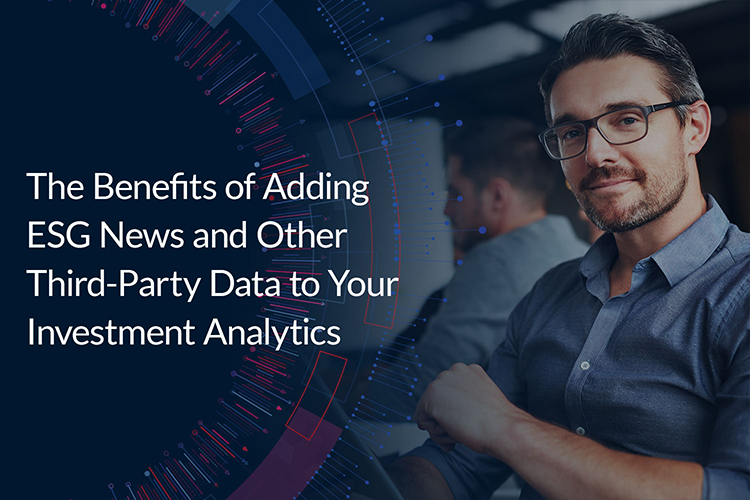Nearly 9/10 executives consider investing in AI and data to be a top priority for their company. But 8/10 of those initiatives are likely to end in failure. In this post, we explore the key reasons behind...
Large Language Models and generative AI tools have transformed the way organisations bring order to the vast amount of online and offline data available. AI can narrow down this data universe to a concise...
Artificial intelligence (AI) offers an incredible amount of opportunity from enhancing productivity to managing information. But, because AI "learns" from the data you give it, it's critical to develop...
In consulting, every opportunity starts with a market trigger, whether it be a change in leadership, a new industry regulation or an unexpected shift in investor sentiment. These trigger events can open...
See how Nexis+ AI and Nexis ® Data+ help management consultants power faster research, credible insights, and compliant AI innovation. As a management consultant, data is your competitive edge. Whether...

In recent years, financial services organisations have faced increased pressure to consider environmental, social, and governance (ESG) factors in their investment portfolios and strategies. It isn’t the first time. In the 1970’s, anti-war sentiment and concern for the environment sprouted a movement, but it languished for years. In the mid-2000’s, the United Nations began prioritizing ESG and commitments to ESG by major companies began to grow. As a result, investment firms and other financial institutions need more—and better—insights into ESG factors that may restrict or support financial performance. ESG news and other third-party data can give you an edge. Let’s take a closer look at how.
ESG Will Be a Differentiator In the Future
Why is ESG a hot topic in financial circles now? While it was already on an upward trajectory, several factors have led to its acceleration, including:
- Increased frequency of disruptive weather events tied to global warming;
- Social issues exacerbated by the pandemic and geo-political conflicts;
- Governance concerns in the wake of increased regulation to drive sustainable business practices.
McKinsey notes, “Inflows into sustainable funds, for example, rose from $5 billion in 2018 to more than $50 billion in 2020—and then to nearly $70 billion in 2021.” Even with the economic downturn in 2022, ESG-related investments added $120 billion last year, says McKinsey’s research.
And it’s not just investors paying attention to ESG. Consumers have raised their expectations for the organisations they entrust with their money, whether it’s buying a product or adding to an investment portfolio. As a result, says global consultancy EY, “Sustainability has become a strategic imperative for companies as they position themselves for the future.”
Using Third-Party Data to Enhance Investment Decisions
“Companies that embed purpose in their business model not only mitigate risk; they can also create value from their values,” McKinsey notes. But to achieve the dual benefits of improved risk awareness and value generation, you need data-driven insights.
Adding Environmental, Social, and Governance (ESG) news and other third-party data to investment analytics can bring several benefits, including:
Improved risk assessment: ESG factors can significantly impact a company's financial performance and stability. ESG news can help you gain a deeper understanding of the potential risks and challenges a company faces, which can help inform investment decisions. In addition, as the regulatory landscape expands to cover ESG, legal and regulatory data can help predict how new laws may impact investment targets.
Increased transparency: Third-party data can provide more comprehensive and objective information on a company's ESG performance. For example, ESG ratings considered in combination with news mentions about an organization’s ESG commitments (or failings) can be combined with company financials and other data so you can make informed decisions about a company's social and environmental impact and its governance practices.
Enhanced portfolio performance: Research has shown that companies with strong ESG practices tend to have better financial performance and lower risk compared to companies with weaker ESG practices. By incorporating ESG news and other third-party data into investment analytics, investors can identify companies with strong ESG practices, which can lead to better portfolio performance.
Better alignment with personal values: Many investment firms are making a firm commitment to ESG, so ESG data can help investors assess the ESG performance of companies and make investment decisions that are aligned with your ESG commitments.
Improved stakeholder engagement: Companies with strong ESG practices win with their stakeholders, including employees, customers, suppliers, and local communities. Understanding what stakeholders prioritize—insights you can capture from news, social commentary and other third-party datasets—enables you to broaden your appeal with potential investors, meet the expectations of your employees, and deliver value, not just for your business but for the wider community.
Interested in learning how Nexis Data as a Service can help? See how one ESG analytics firm uses our enhanced data to drive insights, then contact us to talk with a data as a service specialist.